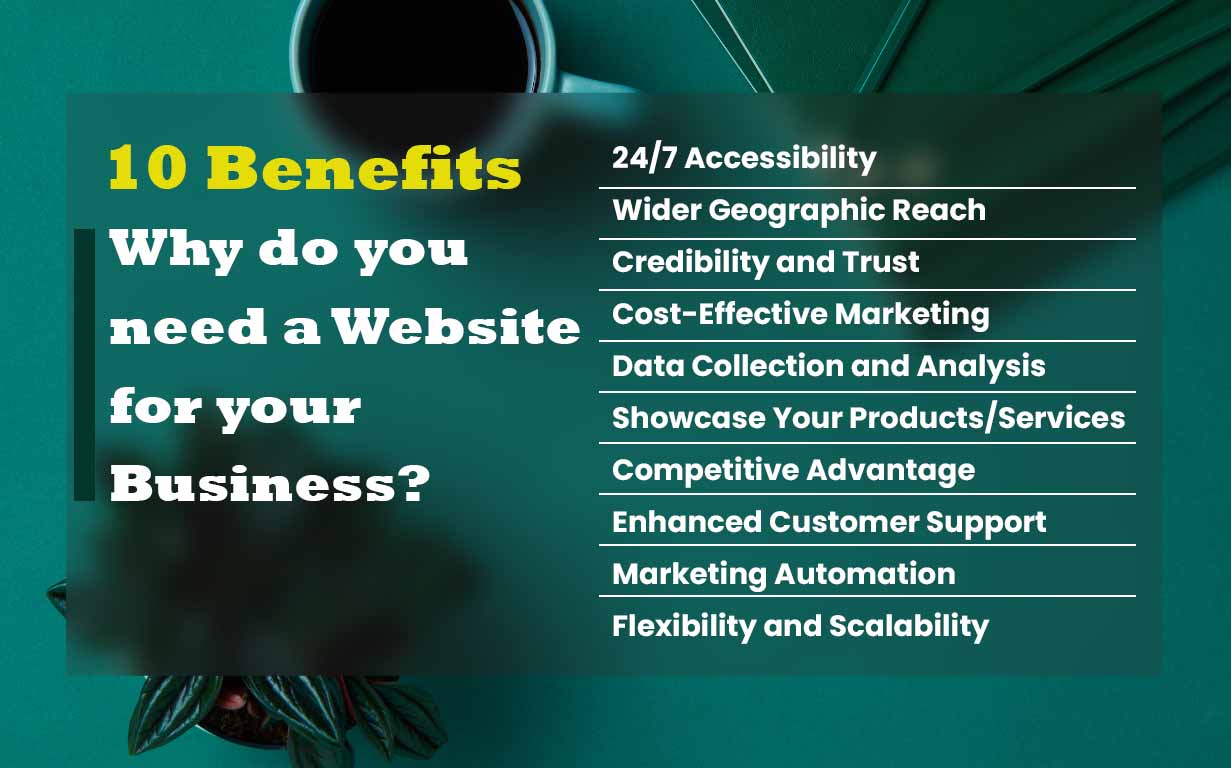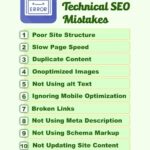Why Do You Need a Website for Your Business? Exploring the Digital Frontier
In the digital age, a business without a website is like a ship without a compass. It’s difficult to navigate the vast sea of opportunities and reach your destination without a clear direction. Whether you run a small local store or a global enterprise, having a website is no longer a luxury but a necessity. In this comprehensive guide, we will explore the reasons why you need a website for your business and how it can be a game-changer in today’s competitive landscape.
1) The Digital Transformation
1.1 The Business Landscape Has Evolved
The business landscape has undergone a radical transformation in recent years, primarily driven by the rapid growth of the internet and digital technologies. Consumers now turn to the web for almost everything, from researching products and services to making purchasing decisions. As a result, businesses that want to thrive and remain relevant must establish a strong online presence.
1.2 What Is a Business Website?
A business website is a digital platform that represents your brand and provides information about your products or services to a global audience. It serves as the digital face of your business, offering a virtual storefront where potential customers can learn about your offerings and interact with your brand.
2) The Top Reasons Why You Need a Website
2.1 24/7 Accessibility
One of the most significant advantages of having a website is that it’s accessible 24/7, allowing potential customers to learn about your business at any time, day or night. This continuous accessibility means you can capture leads and sales even when your physical store or office is closed.
2.2 Wider Geographic Reach
A website eliminates geographical barriers, enabling you to reach a global audience. Whether you’re a local bakery looking to attract nearby customers or an e-commerce store targeting international markets, a website opens up opportunities to expand your reach far beyond your physical location.
2.3 Credibility and Trust
Having a professionally designed website lends credibility and trustworthiness to your business. In the eyes of consumers, a well-maintained website signifies that your business is legitimate and reputable. It’s often the first point of contact between your brand and potential customers, and a polished website makes a positive first impression.
2.4 Showcase Your Products or Services
Your website serves as a digital catalog where you can showcase your products or services in detail. High-quality images, informative descriptions, and customer reviews can help potential buyers make informed decisions, increasing the likelihood of conversion.
2.5 Cost-Effective Marketing
Compared to traditional marketing channels like print media and television ads, online marketing through your website is highly cost-effective. You can leverage various digital marketing techniques, such as search engine optimization (SEO), content marketing, and social media advertising, to promote your business without breaking the bank.
2.6 Data Collection and Analysis
Websites provide valuable insights into consumer behavior and preferences. Through tools like Google Analytics, you can gather data on website traffic, user demographics, and conversion rates. This data allows you to make informed decisions and tailor your marketing efforts to better serve your audience.
2.7 Competitive Advantage
In today’s competitive business environment, having a website can give you a significant edge over competitors who have yet to establish an online presence. It allows you to keep up with industry trends, connect with your target audience, and stay relevant in the market.
2.8 Enhanced Customer Support
Your website can serve as a hub for customer support and information. Frequently asked questions (FAQs), chatbots, and contact forms provide convenient ways for customers to get the assistance they need. This improves customer satisfaction and builds trust.
2.9 Marketing Automation
With the right tools and integrations, your website can automate various marketing tasks. For example, you can set up email marketing campaigns, schedule social media posts, and send personalized offers to website visitors. Automation saves time and enhances customer engagement.
2.10 Flexibility and Scalability
Websites offer the flexibility to adapt and grow with your business. Whether you need to add new products, update pricing, or expand your services, you can easily make these changes on your website. This scalability ensures that your online presence evolves alongside your business.
3) Types of Business Websites
3.1 E-Commerce Websites
E-commerce websites are online stores that enable businesses to sell products or services directly to customers. These websites feature product listings, shopping carts, and secure payment processing systems. Popular e-commerce platforms include Shopify, WooCommerce, and Magento.
3.2 Informational Websites
Informational websites are designed to provide valuable content and information to visitors. They often include blogs, articles, and resources related to the industry or niche. These websites are excellent for building authority and engaging with your audience.
3.3 Portfolio Websites
Portfolio websites are ideal for showcasing your work and talents. They are commonly used by freelancers, artists, photographers, and creative professionals to display their portfolios and attract potential clients or employers.
3.4 Lead Generation Websites
Lead generation websites are focused on capturing visitor information, such as email addresses, through forms and landing pages. These websites are effective for businesses looking to build a mailing list or nurture leads for future conversion.
3.5 Corporate Websites
Corporate websites are the digital face of large organizations and corporations. They typically include information about the company’s history, mission, products or services, and contact details. Corporate websites often serve as a hub for investor relations and corporate communications.
3.6 Social Media Websites
While not traditional websites in the conventional sense, social media platforms like Facebook, Instagram, and LinkedIn can function as essential online extensions of your business. These platforms enable you to connect with your audience, share content, and build a community around your brand.
4) Building Your Business Website
4.1 Choosing a Domain Name
Your domain name (e.g., www.yourbusinessname.com) is your digital address. It should be relevant to your business, easy to remember, and reflect your brand identity. Once you’ve chosen a domain name, register it through a domain registrar or hosting provider.
4.2 Selecting a Web Hosting Provider
Web hosting is a service that allows your website to be accessible on the internet. Choose a reliable hosting provider that offers the features and resources your website needs. Popular hosting providers include Bluehost, SiteGround, and HostGator.
4.3 Content Creation and Management
High-quality content is the cornerstone of your website. Create engaging, informative, and relevant content that resonates with your target audience. Utilize content management systems (CMS) like WordPress, Joomla, or Drupal to easily update and manage your website content.
4.4 Design and Layout
The design and layout of your website should align with your brand’s aesthetics and messaging. Consider hiring a professional web designer or using website builders like Wix, Squarespace, or WordPress themes to create an appealing and user-friendly design.
4.5 Mobile Responsiveness
Ensure that your website is optimized for mobile devices. With the increasing use of smartphones and tablets, a mobile-responsive design is critical to provide an excellent user experience across all screen sizes.
4.6 Search Engine Optimization (SEO)
Implement SEO best practices to improve your website’s visibility in search engine results. This includes optimizing content, using relevant keywords, creating meta tags, and building high-quality backlinks.
4.7 Security Measures
Protect your website and user data by implementing security measures such as SSL certificates, regular software updates, and strong password policies. Security breaches can severely damage your reputation and business.
4.8 Analytics and Tracking
Set up web analytics tools like Google Analytics to monitor your website’s performance. These tools provide valuable insights into visitor behavior, traffic sources, and conversion rates, helping you refine your digital marketing strategies.
4.9 Launch and Promotion
Once your website is ready, promote it through various channels, including social media, email marketing, and search engine marketing. Ensure that your website’s URL is prominently displayed on all marketing materials.
5) Maintaining Your Business Website
5.1 Regular Updates
Keep your website content and software up to date. Regular updates not only improve security but also ensure that your website remains relevant and informative.
5.2 Monitoring and Analytics
Continuously monitor your website’s performance and user engagement through analytics tools. Use this data to make informed decisions and refine your online strategies.
5.3 Content Management
Consistently produce fresh, valuable content to engage your audience and maintain your website’s relevance. Regularly update blog posts, product listings, and other relevant information.
5.4 Customer Interaction
Engage with your website visitors through feedback forms, chat support, or contact forms. Respond to inquiries promptly and address customer concerns to build trust and loyalty.
5.5 Security Checks
Regularly check for security vulnerabilities and implement necessary security measures. This includes monitoring for malware, ensuring data encryption, and conducting regular security audits.
6) Real-Life Success Stories
6.1 Case Study: “Small Local Business Goes Global”
Meet a local bakery owner who decided to create a website to showcase her delicious pastries. With an online presence, she started receiving orders from customers not just in her town but from across the country. The website helped her expand her business, hire more staff, and fulfill her dream of reaching a global audience.
6.2 Case Study: “Scaling E-Commerce Success”
Explore the journey of an e-commerce startup that began with a simple website. Through strategic marketing and customer engagement, they grew their online store into a thriving e-commerce business, reaching customers in multiple countries and achieving impressive sales figures.
Conclusion
In a world where the internet is the go-to source for information and commerce, having a website for your business is no longer an option but a necessity. It offers accessibility, credibility, and a competitive edge that can propel your business to new heights. Whether you’re a local store or a global enterprise, a well-designed and maintained website can be your gateway to success in the digital age. Embrace the digital frontier, build your business website, and embark on a journey of growth, engagement, and limitless possibilities. Your website is your digital compass—navigate wisely.




